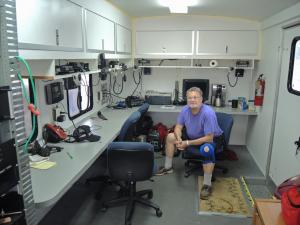Radio Emergency Services save County $100k+ per year with Time Tracking Reports
Custom Reports
Accurate Time Tracking
Volunteers Enter Data
The Nassau County Amateur Radio Emergency Services, or NCARES, provides emergency communications services for Nassau County, Florida and the surrounding areas. There are 75 different ARES sections in the US, as listed by the National Association for Amateur Radio, but there aren’t many ARES groups quite like Nassau County.
NCARES is unique because they are directly affiliated with the Nassau County Sheriff’s Office, which is in charge of emergency services. “We’re considered unpaid employees for the county. We have uniforms, vehicles, and are covered by their insurance. We’re primarily activated in storms and natural disasters,” says Bud Sinor, Emergency Services and Volunteer Coordinator for NCARES.
In the event of a natural disaster, NCARES members will deploy staff to set up radio operations in local schools that serve as emergency shelters. In addition to using police radios and telephones, they have their own radio network system that can run temporary communications when phone lines and towers go down. They even have operators who are certified in military frequencies and communications in the event they need to contact military branches.
Tracking hours could be considered mission critical for NCARES. Their volunteer hours count as credit toward FEMA relief funds for the county at $29 an hour. The county is required to pay for a portion of FEMA services in the event of a natural disaster such as a hurricane, but with the volunteer hours credits they can save about one-third of the budget. “We average 4,000 to 5,000 man hours annually over the last 5 years, which equates to somewhere between $100,000 and $150,000 each year in savings,” Bud explains.
It’s important for NCARES not only to track hours, but to report on them as well. In addition to being deployed for emergency services, they hold regular board meetings and field training exercises. NCARES sends reports to FEMA four times a year, and must also report to the National Association for Amateur Radio. The national association is responsible for keeping track of all ARES stations and handles the licensing of HAM radio operators for the FCC. “I have to send the number of public service vs. emergency hours each month to the [association]. We have one of the largest hour inputs in the United States for emergency communications. We operate 8 hours a day, 5 days a week and 24/7 in emergency times,” Bud says.

NCARES members are always on the lookout for potential accidents and disasters in their area, and they make sure these incidents are reported to the correct agency. Some examples include notifying the FAA of a plane crash, or the police and fire departments of a train accident and potential chemical spill. In those cases, they even send emergency coordinators into the field to report on the situation in person.
Thanks to Track it Forward, Bud can export and send reports with ease. All reports can be customized with filters to export just the data you need, and then saved for future exports. “I’m particularly fond of [the reports]; I can export those to excel and…upload to our FEMA reporting software,” Bud says.
Prior to implementing Track it Forward, NCARES was using pen and paper to track volunteer activities, and then those hours had to be manually entered into excel. “Having members…enter their own time, saves me 15 hours a month directly,” Bud explains. The ease with which he can filter, save, and export reports allows for even more time savings. “I love that, it’s saved me 10-20 hours a month at least!” he says. Track it Forward is proud to help such an essential organization save time on administrative work and get back to doing their work that really matters in the community.

